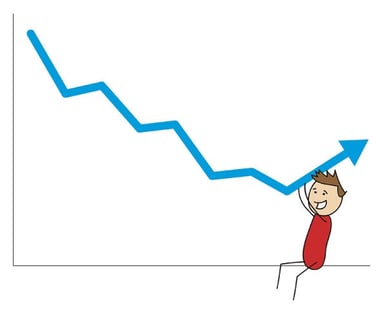Guest Blog Post Authored By: Cheryl Griffiths, Account Manager, National Leasing.
You just experienced the disorientation from Googling “Falling Oil Prices.” Are you any closer to knowing the effect these low prices have on your business? Probably not since no one knows what the exact outcomes of the price drop will be.
Suggested Reading: Why oil prices keep falling
Falling oil prices will be a benefit to some businesses and a loss for others. Companies that rely on the energy industry may be hit hard, while other companies driven by consumer spending could see a sales jump thanks to increased disposable income.
Leasing can ease the negative financial impact from falling oil prices or help capitalize on a sales increase. Let’s take a look at five ways leasing will help you take advantage of a decrease or increase in sales.

Reducing the impact of a changing economic environment
1. Sale-leasebacks
Sale-leasebacks are perfect for injecting cash flow into your business when capital reserves are low. A sale-leaseback is pretty simple and it works like this: you’ll sell your business’s equipment for fair market value to a finance company and then lease it back over a fixed payment period, just like a normal lease. Your accountant can explain to you how this helps your balance sheet.
The only things to consider: your business must have purchased the equipment within the last six months and any sale-leaseback is subject to credit approval.
2. Refinancing equipment
“Creative” isn’t necessarily the first word that springs into mind when you consider financial institutions, but most are deft at lowering the payments of your existing loan or lease. Ask your financier if rewriting or consolidating your debt is an option.
But remember, you might pay a penalty for rewriting your payment schedule if you’re locked into a higher rate.
3. Skip leases
Skip leases let you push back your payments for a short time. You’ll have two options: a three month or six month deferred payment. But the question here is, “does your business need the equipment?”
Here are two scenarios to consider:
Scenario 1
Your sales are negatively impacted by the low price of oil, but you have strong reason to believe the price drop will only last a few months and that your sales will likely rebound afterward, even outpacing previous sales projections. Here, it makes sense to enter into a skip lease for better equipment. Your new equipment ensures your business is ready to meet new demand once sales pick up, and you’ll pay nothing over the next few months when sales are slow.
Banking on a future sales increase in tough times isn’t exactly a creditor’s dream scenario when approving a finance application. Ensure you already have strong credit before applying.
Scenario 2
You’re in the same sales situation as Scenario 1 except your sales outlook is uncertain. Here, it’s probably best to hold off on a skip lease, or any lease for that matter, until you’re confident sales will stabilize back to normal levels.
"The idea behind leasing is that you'll get your equipment and stay financially flexible."
Capitalizing on increased sales
Sales are booming and you’re struggling to meet demand. You have no idea whether this sales increase is permanent or temporary, but one thing is certain: your production must increase. How can leasing help your business?
4. Lease new equipment
The idea behind leasing is that you’ll get your equipment and stay financially flexible. Instead of one expensive upfront purchase, you’ll split that cost into smaller payments over months or years, saving money for other business inputs or more equipment. And of course, upgrading your equipment will up your business’s productivity.
Other benefits of leasing:
- Flexible payment structures – schedule your payments on a monthly, seasonal, semi-annual or annual basis
- No down payment
- Potential tax advantages – speak with your accountant for more information
5. Lease used equipment
If you find used equipment your business needs but you’re worried about financing, don’t be. Most leasing companies will lease used equipment, too, and all the above benefits still apply. Terms and conditions for leasing used equipment will vary depending on financial institution, but for some perspective, at National Leasing, we lease equipment that’s up to 15 years old.
Some final advice
Don’t panic!
Take a serious look at your business and ask questions:
- What are reputable institutions like the Bank of Canada predicting?
- What business decisions can you make to adapt?
- What are other smart and successful businesses doing?
- Can you tailor their strategies to fit your goals?
Leasing will fit most strategies, but it’s only one way to capitalize or reduce the impact of low oil prices. The more financing options you have, the better. Use your lines of credit for large asset acquisitions, and rely on leasing for convenient and flexible payment schedules that don’t touch your credit lines.
Do your research, learn as much as you can and then adopt a strategy that maximizes your business potential.
.png)


